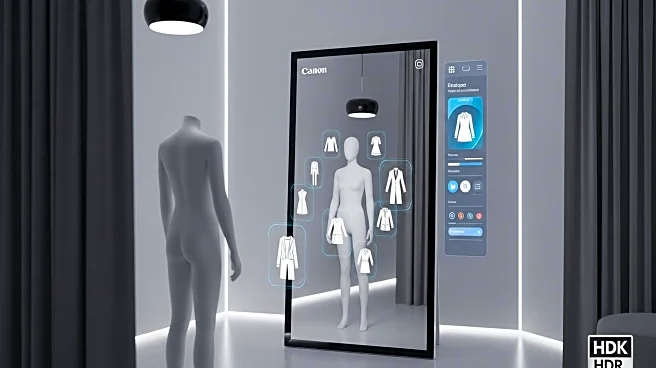What's Happening?
The fashion industry is experiencing a significant transformation driven by artificial intelligence (AI), with numerous startups emerging to capitalize on this technological shift. According to a recent compilation by The Business of Fashion, 18 AI-powered startups are making strides in the industry by offering solutions that range from generating imagery to enhancing product listings and personalizing recommendations. These startups have collectively raised over $400 million in the past five years, highlighting the strong investor interest in AI applications within fashion. Notable companies include Bing, a platform for jewelry design and marketing, and Spangle, which uses proprietary GPT technology for personalized product pages. These startups are partnering with major brands like Revolve, Alexander Wang, L.L. Bean, and Skims, showcasing their growing influence in the market.
Why It's Important?
The integration of AI into the fashion industry is poised to significantly impact how products are manufactured, marketed, and sold. By leveraging AI, fashion companies can reduce costs and quickly adapt to changing trends, potentially reshaping the competitive landscape. Startups have the advantage of agility, allowing them to innovate rapidly compared to larger tech firms that may need to adapt existing technologies. This shift could lead to new industry leaders and disrupt traditional business models. As AI continues to evolve, it offers the potential to streamline operations, enhance customer experiences, and drive growth in the fashion sector.
What's Next?
The future of AI in fashion will likely involve increased competition among startups and established tech giants, each vying for consumer attention and market share. Startups must differentiate themselves to avoid direct competition with larger firms and each other. As the industry navigates this technological evolution, companies will need to build robust business models to withstand potential market fluctuations reminiscent of the dot-com boom. Investors are keenly watching to identify the key players that will emerge as leaders in this AI-driven transformation.
Beyond the Headlines
The rise of AI in fashion also raises ethical considerations, such as data privacy and the impact on employment within the industry. As AI automates various processes, there may be shifts in job roles and the need for new skill sets. Additionally, the reliance on AI for decision-making in fashion could influence cultural trends and consumer behavior, potentially altering the industry's traditional dynamics.









